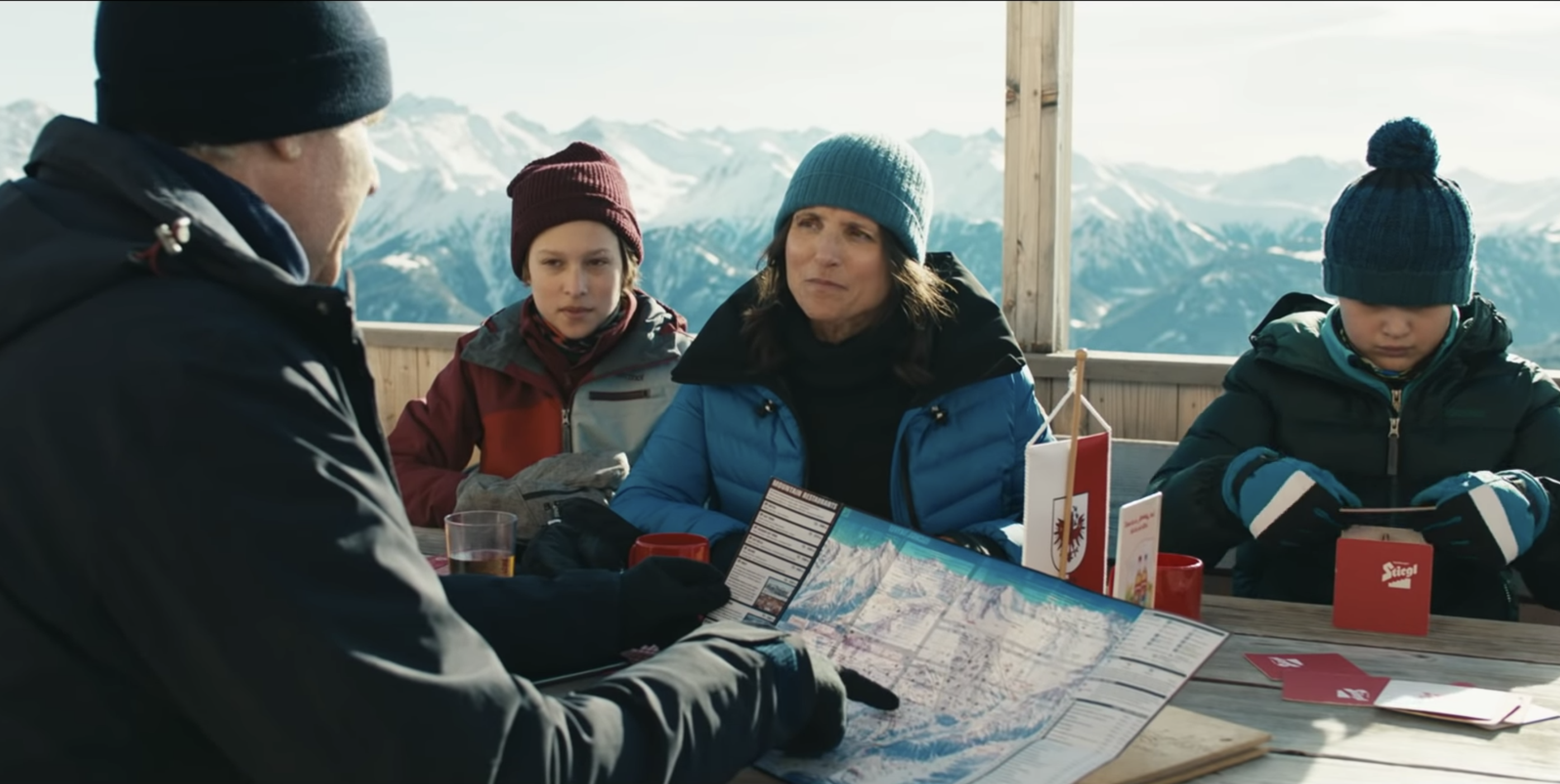Last night I finally saw Nat Faxon and Jim Rash‘s Downhill (Searchlight, 2.14.20), which is a fairly straightforward remake of Rubin Ostlund‘s Force Majeure (’14). Downhill is almost a half-hour shorter than the ’14 version, but otherwise I found it better than decent — adult, well measured, emotionally frank, well acted and cunningly written. (Faxon and Rash shared screenplay credit with Jesse Armstrong.)
It’s not a burn, it’s not about a “black and white situation” (as one of the less perceptive characters puts it) and it provides ample food for thought and discussion.
Both films conclude that a father running from an impending disaster (i.e., a huge avalanche) without trying to save or protect his wife and kids is a bad look. Which of course it is. Both films condemn the dad in question (Will Ferrell in the newbie, Johannes Bah Kuhnke in Ostlund’s version) and more or less agree with the furious wives (Julia Louis Dreyfus, Lisa Loven Kongsli) that dad should have (a) super-heroically yanked the wife and kids out of their seats and hauled them inside in a blink of an eye or (b) hugged them before the avalanche hit so they could all suffocate together.
Hollywood Elsewhere says “yes, it’s ignoble for a dad to run for cover without thinking of his wife or kids,” but I also believe that instinct takes over when death is suddenly hovering. I also feel that Dreyfus and the two kids acted like toadstools by just sitting there on the outdoor deck and hoping for the best.
Question for Dreyfus and sons: A huge terrifying avalanche is getting closer and closer and you just sit there? You have legs and leg muscles at your disposal, no?. A massive wall of death is about to terminate your future and your reaction is “oh, look at that…nothing to do except watch and wait and hope for the best”?
Both films film basically ask “who are we deep down?” They both suggest that some of the noble qualities we all try to project aren’t necessarily there. But Rash and Faxon’s film also says “hey, we’re all imperfect and yes, some of us will react instinctually when facing possible imminent death. So maybe take a breath and don’t be so viciously judgmental, and maybe consider the fact that tomorrow is promised to no one so just live and let live.”
I was especially taken by Downhill‘s spot-on philosophical ending (i.e., “all we have is today”). Seriously, it really works. I came to scoff at this film (due to the less-than-ecstatic Sundance buzz) but came away converted.
The only problem is that too many critics are bitching about the low-key, less-than-assertive comedic factor.
Earth to Rhodes scholars: Downhill isn’t supposed to be hah-hah “funny.” At best it’s an LQTM-er, and I was down with that. Having seen the original ad hacving an IQ over 50 meant that I didn’t expect a laugh riot. How could there be? And yet doofus critics are saying “why isn’t it funnier?…if Ferrell and Dreyfus are costarring it’s got to be funny, right? But I didn’t laugh that much so waaahhh.”
Free your minds and souls. Will Ferrell is a human being as well as a funny guy, so ease up on your expectations. He’s playing it more or less straight here, and if you’re any kind of adult that shouldn’t be a problem. If you’re an emotional infant who wants his/her bottle then maybe it will be. Just remember that “merely making people laugh is the lowest form of comedy” — an old Michael O’Donoghue remark. Dramedies that sprinkle their narratives with minor heh-heh moments represent a much higher synthesis.
Yes, Force Majeure is a better film than Downhill, but the latter isn’t half bad. It really isn’t. And these days a feature that only runs 86 minutes is quote the disciplined anomaly.

